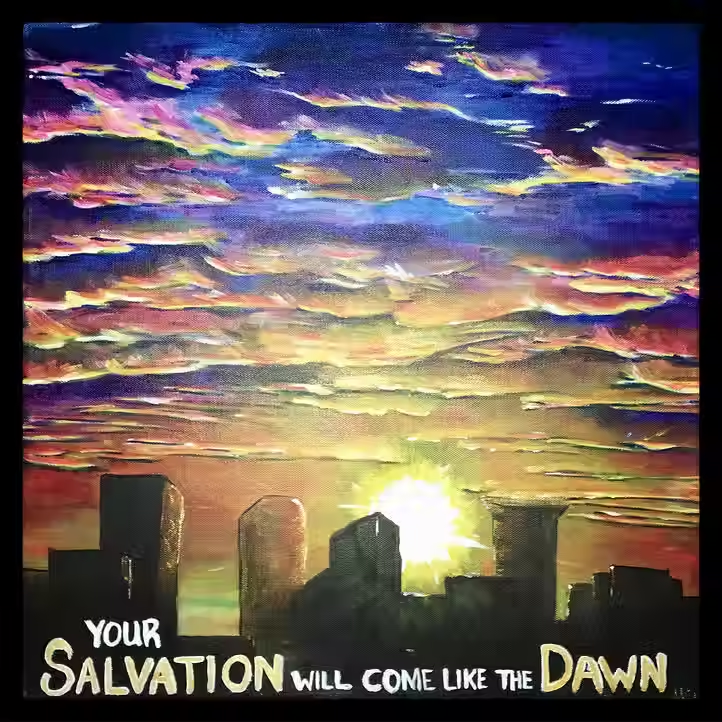Hope is a Song in a Weary Throat
- Amanda Munroe

- Dec 26, 2023
- 3 min read
A Christmas reflection for Tuesday, December 26th by Amanda Munroe
Lectionary reading for 12/26/2023: Isaiah 9:2-7,Psalm 96,Titus 2:11-14,Luke 2:1-14,Luke 2:15-20
Selected passage for reflection: Psalm 96
Read
Psalm 96:1-3 NIV
1 Sing to the Lord a new song;
sing to the Lord, all the earth.
2 Sing to the Lord, praise his name;
proclaim his salvation day after day.
3 Declare God’s glory among the nations,
God’s marvelous deeds among all peoples.
Reflect
These few days between Christmas and New Year’s Day are among my most treasured all year. It is one of the few times in adult life when enough of us simultaneously agree to pause that the hush reverberates and “not doing” is not only allowable, it is normal.
Some years I can accept the rest like a Christmas gift that keeps on giving. I sleep in, leave my phone on “do not disturb,” and eat only leftovers, barely aware what day it even is. Other years, accustomed to being busy, I fabricate projects for the in-between time, mostly because I don’t know how to be otherwise.
Recently, as I’ve grown more committed to rest as a form of resistance to oppression (many thanks to the wisdom of “Nap Bishop” Tricia Hersey), I rest with intention. And as I’ve rested, I’ve encountered a foreboding undertone.
When deep rest happens, when I feel safe enough to let my body and mind stop working, I often find that the unresolved and unresolvable stories of my life become plain. I bet you know what I’m talking about, the experience of slowing down enough that what’s under the surface, well, surfaces. And then you’re in it. Stuck with yourself in the stuff of your life, when what you thought you were doing was taking a “break.”
Today, in the middle of the rest quagmire and leftovers-stupor, we read the Psalmist’s jubilant instructions to “Sing to the Lord a new song” and “Declare God’s marvelous deeds”!
Come again? How am I to do this from the middle of my rest quagmire?!
Pauli Murray, renowned 20th-century legal scholar, civil rights advocate, poet, gender outlaw, and the first African-American woman vested as an Episcopal priest, wrote: “Hope is a song in a weary throat.”
Singing Christ into our midst in the waning days of this relentlessly violent year is a radical, world-upending act of hope, no matter the tenor of the song. My guess is that rest, even or precisely because it surfaces all the stuff, is one way to practice hope. Unlike optimism, which is the logical outcome of the odds being in our favor, choosing to hope is a practice we can adopt no matter the odds. Hope is a song we choose to sing, sometimes from a throat saturated in the stuff of its own life. What does a new song sound like when it comes from a weary throat?
The lectionary passages from today proclaim the coming of a world that glorifies the Prince of Peace, signified by wholeness, goodwill, and an end to war. Hope is how we participate in this coming world, even as we are wearied by the world that is now. Hope is not denial. It is an honest song, a song of love.
Respond
In the cradle of these days between Christmas and the New Year, consider how you might rest, how you might hope, and how the two may be linked. Consider sleeping in, lingering over the scripture passages, or spending quiet time with yourself, a loved one, or beloved pet.
Allow yourself to choose to rest and choose how to rest, then observe what hopes arise from this choice.
Rest
From “Dark Testament: Verse 8” by Pauli Murray
Hope is a crushed stalk
Between clenched fingers.
Hope is a bird's wing
Broken by a stone.
Hope is a word in a tuneless ditty—
A word whispered with the wind,
A dream of forty acres and a mule,
A cabin of one's own and a moment to rest,
A name and place for one's children
And children's children at last.
Hope is a song in a weary throat.
Give me a song of hope
And a world where I can sing it.
Give me a song of faith
And a people to believe in it.
Give me a song of kindliness
And a country where I can live it.
Give me a song of hope and love
And a brown girl's heart to hear it.
Radcliffe Institute for Advanced Study at Harvard University. “Pauli Murray Reads "Dark Testament”.” Accessed November 6, 2023. https://www.radcliffe.harvard.edu/news-and-ideas/pauli-murray-reads-dark-testament.
About the Author

Amanda Munroe lives in the Hudson Valley and loves to hear crunching and sloshing sounds when she walks, whether through leaves, snow, or slush. She spends her days imagining a peaceful world and then implementing strategies for how to get there in her job directing restorative practices at a small liberal arts college populated by as many trees as it is people.
Amanda holds an M.Div from Union Theological Seminary, where she was the recipient of the Kneeland Preaching Prize and the Robert Wood Lynn Fellowship for Promise of Excellence in Teaching. She enjoys guest preaching and offers one-to-one spiritual care. Reach out to Amanda at am5520@utsnyc.edu and https://www.linkedin.com/in/amandamunroe123.





Comments